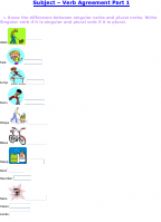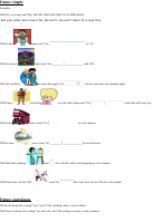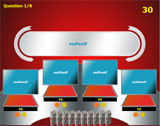
future tenses - all four of them
get to know the four future tenses, the simple future, future continuous, future perfect and future perfect continuous
Level: intermediate
Age: 10-100
|

Simple Present and Present Continuous Tense
this exercise centers on the usage of DO and DOES as well as identifying whether a sentence is either simple or present continuous tense..
Level: elementary
Age: 10-14
|

past simple and past continuous
a very simple exercise for past simple and past continuous
Level: elementary
Age: 10-14
|

Confusing word: GET
GET is a simple verb, however the word GET has different meanings. in this exercise, you will learn to differentiate GET into 7 different meanings. Enjoy!
Level: intermediate
Age: 10-100
|

Subject Verb Agreement
In order to make good and correct English grammar one has to learn the basic rules of subject and verb.
this exercise is comprise of 4 parts subject-verb agreement. Enjoy learning!
Level: intermediate
Age: 10-100
|

simple and continuous future tense
an exercise for simple and future continuous ense
Level: elementary
Age: 10-14
|

CAN/CANïŋ―T & HAVE TO/HAVENïŋ―T
who wants to be a millionaire kind of game
Level: elementary
Age: 6-14
|

Subject - Verb Agreement Part 3
part 3 of the subject - verb agreement
Level: intermediate
Age: 10-14
|

Simple Past Irregular Verbs
An interactive game that a student can play as well as learn.
Level: elementary
Age: 10-14
|

Simple Present and Present Continuous Tense
this exercise centers on the usage of DO and DOES as well as identifying whether a sentence is either simple or present continuous tense..
Level: elementary
Age: 10-14
|